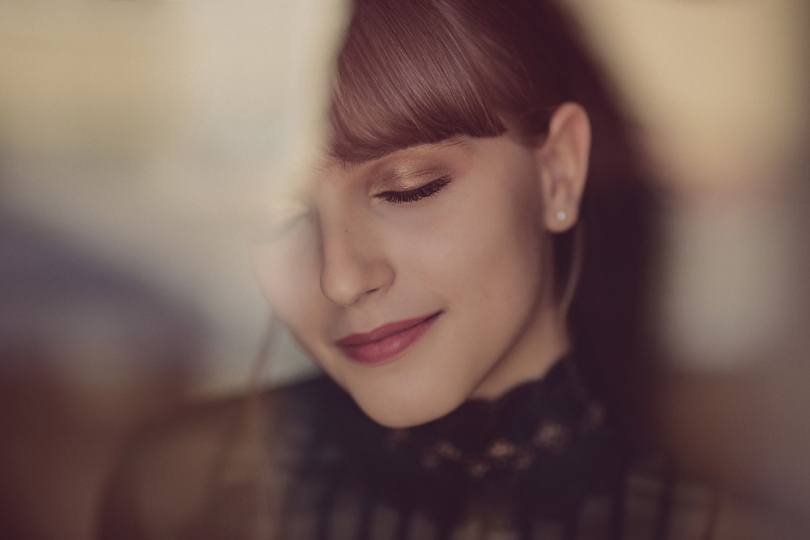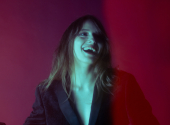
Nina Kohout: On the Slovak Scene, a New Talent Is a Cause for Celebration
For a couple of years, she has been singing with the band Autumnist. Last September, she started studying music technology at a school, which has rejected a lot of shining talents, with the notable exception of Adele and Amy Winehouse. Therefore, many predict a great future for her. I don't want to be a false prophet. Rather, I'll take the opposite route and capture the leaps she's already made—in case anyone wants to follow in her footsteps. I asked Nina Kohout about her studies, entrance exams, life in England and her music.
I was listening to an interview for LaLa Slovak Music Export. There, you talk about studying production at BRIT School and also about the single "Moonlight." In relation to the single, you mentioned experimenting and a touch of Arabic melodies. I'm not entirely sure about that. I hear some good old-fashioned czardas in there.
The touch of Arabic culture is more present in the two songs that are coming out now. In "Moonlight," I feel more of a classical influence, waltz and maybe folk.
The EP came out on 2/2/2022, funnily enough. Was that the plan from the beginning or did it just work out that way?
It was supposed to come out at the end of last year, but since it got delayed like that, I wanted a date I liked at least.
Let's talk about your studies. There was one thing that struck me. Basically, you grew up at the backstage, sang in the choir from the age of seven and played all sorts of instruments—and then you went to grammar school instead of the conservatory. Why did you and your parents make that decision?
Probably because I hadn't made up my mind to do music. It took me a couple of years to decide that I wanted to do music for a living. After all, making art is risky. You never know where you stand. Most of my family went to grammar school and it seemed natural to start there. Of course, I thought of the conservatory at that time, but I wanted to study production, not an instrument or singing, and that didn't work very well in the Czech Republic or Slovakia. And I didn't want to go abroad when I was fifteen. It was too early for me. But now I'm finishing my studies in England anyway.
How difficult was it to get into BRIT School? It was after Brexit and the entrance exams were probably quite difficult…
Last September, Brexit hadn't advanced that far. It's a lot more difficult now, especially financially, even for students. It was still a challenge to get in. I mean, Adele and Amy Winehouse studied there. I just gave it a shot, thinking I'd do my best. I didn't think I could get in and on top of that to study music technology, which I had absolutely no experience with. I think the examiners saw potential in me, they knew that I would enjoy production and be good at it. It was also challenging to move overseas at seventeen. The first few months were intense, though probably not in a good way, but I was glad I made the move.
Was it enough to fill out the application form or did you have to apply for a scholarship?
No, it's an excellent school and it is completely free. It prioritises only talent, which is why it's so hard to get in. I filled out an application, answered questions like "what my greatest musical strengths are" and they invited me to an entrance exam right before the covid. It consisted of a written test, an interview, and a chat about one of my songs—what effects I used, and other things that were basically new to me. And it was only after the covid that I got a letter in Trenčín (Slovakia, ed.) saying that I was accepted. It was a very long process.
What has been your experience with BRIT School so far? How do they guide you?
In Slovakia, there is a huge emphasis on tests and cramming, in England, we mostly focus on practical work and pushing our creative boundaries. It has deepened my appreciation of music. I realised that music encompasses a lot and that I have many more directions to go.
How much of your studies is focused on theory?
I had seven years of theory in Slovakia. Classical theory is rather absent in the music technology department. But we discussed the beginnings of electronic music (Stockhausen and others who were the first to create electronic music and were considered total madmen in their time) to understand that music is not just about instruments and voices, but an infinite number of sounds.
Speaking of discovering sounds, in the past, you've created songs that the pros found interesting also because they wouldn't be able to compose that way. Have you found yourself thinking that the emphasis on technique might be depriving you of an interesting component of your creativity?
Maybe to some extent, and I should be careful not to drown myself in technique. On the other hand, I've learned to produce on the fly and in my way, and even if I'm told at school that I shouldn't do something because it doesn't make sense in terms of frequency, for example, I'll still try it because it could turn into something interesting. I need to know the rules, but mostly to learn how to break them.
How did you learn when no one taught you? Did you go through tutorials on YouTube?
I was first guided by Vlado Ďurajka (from Autumnist, ed.), who was working in Cubase. I downloaded the freeware, we spent some hours Skyping in the evenings and he showed me the basics. Then I switched to Logic, which we work with here at school. I still spend hours on it trying all sorts of things.
If you were to compare your very first significant composition, "Geisha" for Fallgrapp, with your recent "Blue Sunray," what do you see as the biggest differences in your creative process?
(pauses for a moment) I created "Geisha" when I was about thirteen. It was the first time I composed something and I just remember not knowing what I was doing. Jureš (Líška, the frontman of Fallgrapp, ed.) sent me the background music and said: "Improvise." It was pretty challenging because up until then I had only done covers. The sketch I sent him seemed very weak, and I thought he wouldn't like it. But in the end, he picked out a pretty big chunk of it that still fits the song perfectly. It just seems like a coincidence to me. I composed "Blue Sunray" with more knowledge of harmonies, melodies and chords. And I also knew what I wanted to say to the world and was able to listen to myself better.
"Blue Sunray" came out two years ago on your 16th birthday. You mentioned that in the song, you were dealing with the fact that your older sister had moved to another town and started a family there. You also said that you wouldn't have written it that way again at the time of its release. What did you mean by that?
When things that affect you emotionally happen, it's hugely important to be able to capture them at the right time. If I'd waited a few more months, I wouldn't have been able to empathise so intensely. Tereza (Nina's sister, ed.) has a son now I have come to terms with the whole situation.
"Blue Sunray" is characterised by a diary style of writing, which has become quite common in recent years. How do you feel about your position among considerably young female composers like Snail Mail or Olivia Rodrigo who use music as their diary?
I wouldn't include my music in that concept. I just reflect on what's inside of me because I think music is always a personal statement. At the same time, I am hugely fascinated by sound.
What do you see as the biggest differences between Slovak musicians and their English counterparts?
I can't say almost anything for sure, I am experiencing England during the pandemic, which makes it a bit different. It's definitely so oversaturated with talent that people don't pay as much attention to it. In the small Slovakian scene, a new talent is a cause for celebration. It's a great lesson in humility.
Have you come across musicians who have more than one band, but usually focus on the one which has the best chance of succeeding?
Yes, I have. I know it happens in our school. One bass player is in six bands. But I came here with my own established project. I definitely want to try playing in a band. It's a lot different than being on stage by yourself. At the same time, I need to focus on one thing at a time. That's why Nina Kohout is a priority for me.
Some time ago I interviewed Oliver Torr, who told me that he prefers to work in Prague rather than London because he would have to do very commercial work there to make a living. I know you're still studying, but do you feel the pressure too?
No, but I feel a lot more pressure to break through and build my artistic brand on social media. It's hard for me to accept because I'm mainly interested in music. It's not easy in Slovakia either, but I find it purer in that respect.
In the past, you participated in the Eurosonic Noordeslag showcase for Slovakia. What was the audition like?
That year, the focus was on the Czech-Slovak scene, but all I know is that Vlado told me that I was going to Holland with them (Autumnist, ed.). It was a great experience.
How would you describe him?
I was fifteen, so I was definitely the youngest one there, sitting in one of the two buses full of artists and institutions like Radio FM and then having breakfast with them on the spot. I also really liked Groningen and the festival scattered around the city, from the underground punk spaces to the cathedral.
Have you gained any interesting experience or contacts?
Agents and e-mails were beyond me. I was a guest in Autumnist. The festival mainly showed me that music is happening outside Slovakia and in completely different quality, and inspired me to go back with my own project.
Your father, the clarinettist and saxophonist Petr Kohout is also involved in Autumnist and has been a major influence on you since the beginning. You also make quite similar music. How do you feel about the prospect that one day it might be time to take a different path?
I'm already on it. We are influenced by every new experience. I also perform regularly with my dad in my own project and I'm not going to give up his influence. The same goes for Autumnist. The singles "Blue Sunray" and "Moonlight" share with Autumnist an emphasis on a darker sound, but the overall sound is rather different, like Portishead and Beth Gibbons. So, I would only separate myself from Vlado Ďurajka if I had no other choice. I really respect him as a producer.
If you have found an error or typo in the article, please let us know by e-mail info@insounder.org.


